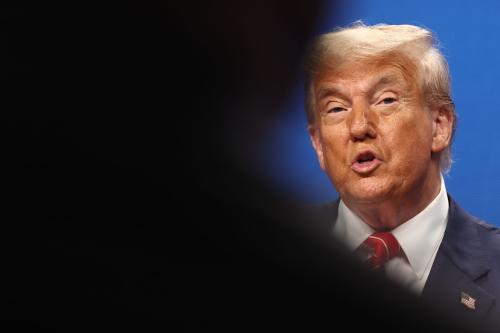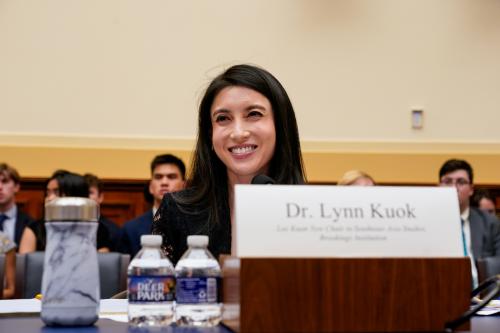“Time is not on the American side,” Kim Gye Gwan, vice foreign minister of North Korea, told me a few weeks ago. “As time passes, our nuclear deterrent continues to grow in quantity and quality.” Those words are an indictment of United States intelligence as well as a potential epitaph on the Bush administration’s failed policy in North Korea.
On Jan. 8, North Korean officials gave an unofficial American delegation, of which I was a member, access to the building in Yongbyon where about 8,000 spent fuel rods had once been safeguarded. We discovered that all 8,000 rods had been removed.
Whether they have been reprocessed for weapons-grade plutonium, as Pyongyang claims, is almost irrelevant. American intelligence believed that most if not all the rods remained in storage, giving policymakers a false sense that time was on their side as they rebuffed North Korean requests for serious dialogue and worked laboriously to devise a multilateral approach to solving the rapidly escalating crisis.
But events of the last several years show that this approach is not working. In December 2002 North Korea was suspected of having one or two nuclear weapons that it had acquired before agreeing in 1994 to freeze its known nuclear program and to allow it to be monitored.
More than a year later, North Korea may have quadrupled its arsenal of nuclear weapons. During the intervening period, the Bush administration has relied on intelligence that dismissed North Korean claims that it restarted its nuclear program at Yongbyon with the express purpose of reprocessing previously sealed and monitored spent fuel to extract plutonium to make a “nuclear deterrent.”
Now there are about 8,000 spent fuel rods missing—evidence that work on such a deterrent may have begun. It is just the most recent failure in a string of serious North Korea-related intelligence failures.
When North Korea claimed in 1998 to have launched a three-stage rocket to put a communications satellite into orbit, American intelligence initially denied the rocket had this capacity—and then, days later, confirmed the North Korean claim. That same year United States intelligence insisted that Pyongyang had embarked on a secret underground project to duplicate its frozen nuclear weapons program. Eight months later, an American inspection team visited the underground site to find that American intelligence was dead wrong. Then there was the intelligence in the summer of 2002 that indicated the North Korean regime was on the brink of collapse. That reporting was later recalled as faulty—but not before the damage was done.
American policy in North Korea is hardly better than American intelligence. At best it can be described only as amateurish. At worst, it is a failed attempt to lure American allies down a path that is not designed to resolve the crisis diplomatically but to lead to the failure and ultimate isolation of North Korea in hopes that its government will collapse.
Having a discussion with North Korea does not mean abandoning the multilateral framework agreed to in 1994. Nor does direct communications mean capitulating to North Korean demands. It simply means serious exploration of what is possible and acceptable to all parties.
This administration must step out from behind China’s diplomatic skirt and take the lead in resolving this crisis before Pyongyang creates a real nuclear deterrent. As it is now, North Korea is calling the shots.
The Bush administration needs to reassert itself—but responsibly. It should appoint a North Korean policy coordinator of the stature and integrity of former Defense Secretary William Perry to bring sanity and adult supervision to the administration’s infighting.
I take President Bush at his word that he desires a peaceful and diplomatic solution to this crisis. He deserves someone who can articulate his vision for the Korean Peninsula and make policy decisions while holding off the worst impulses of some within the administration.
I am concerned that the next round of six-party talks will fail and Pyongyang will withdraw from the diplomatic process. It may then declare that it has developed all the nuclear weapons it needs and that it does not intend to make any more.
China, South Korea and Russia (and perhaps Japan) may well accept this new status quo, arguing that the actual threat is minimal and further nuclear activity has been suspended. And it is easy to see why this new status quo would appeal to them, given the instability that could result if the worst-case scenario of United States policy&151;which is to say, isolation, sanctions and possible military confrontation—comes to pass. The fragile multilateral coalition on which the United States is relying would dissolve.
The result would be a region even more dangerous than it is today—and America and Asia are even less secure now than they were a year ago. How many nuclear weapons does North Korea have to make before this administration gets serious about its policy in East Asia?
The Brookings Institution is committed to quality, independence, and impact.
We are supported by a diverse array of funders. In line with our values and policies, each Brookings publication represents the sole views of its author(s).



Commentary
Op-edWhat I Saw in North Korea
January 21, 2004